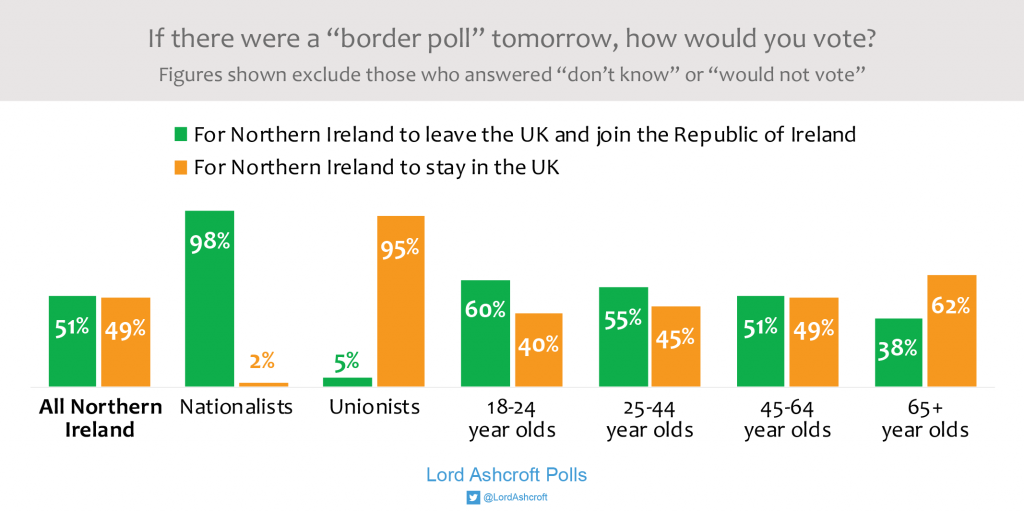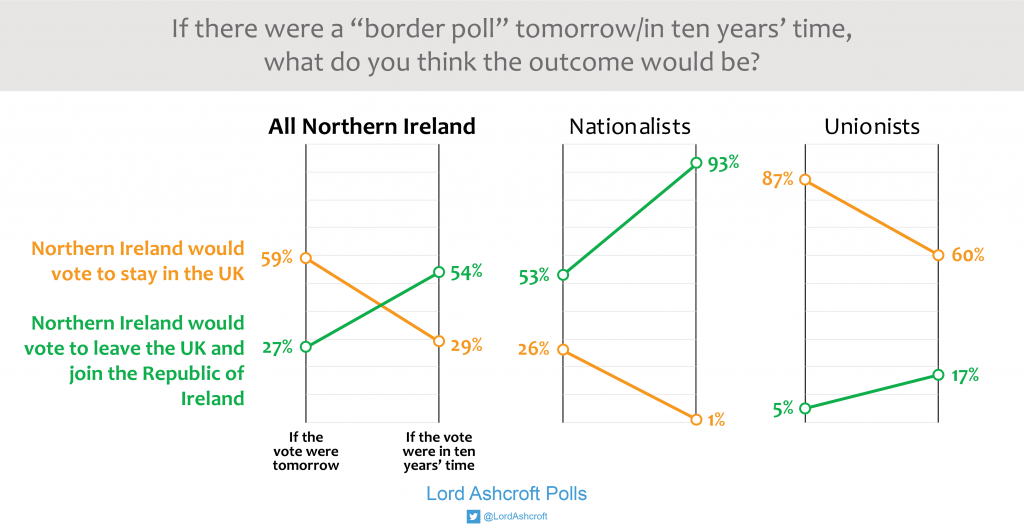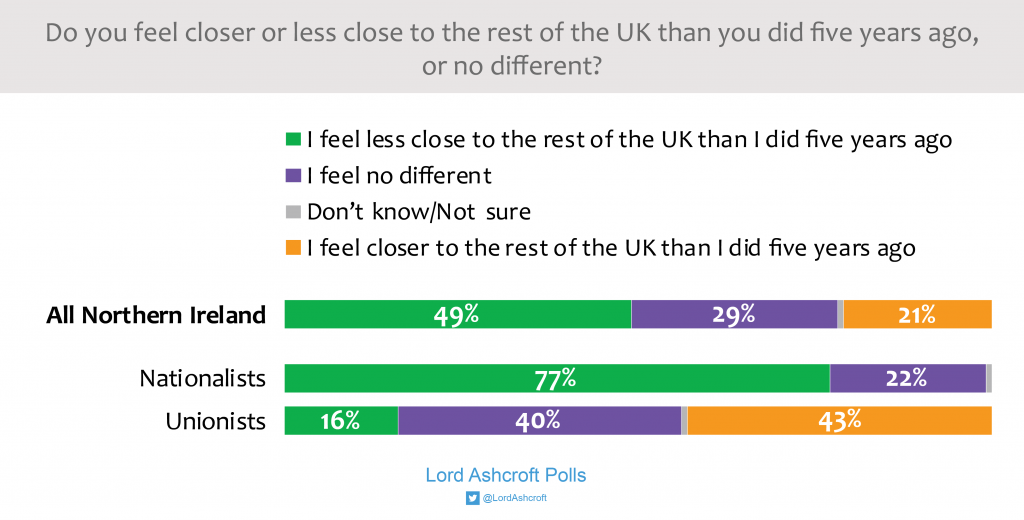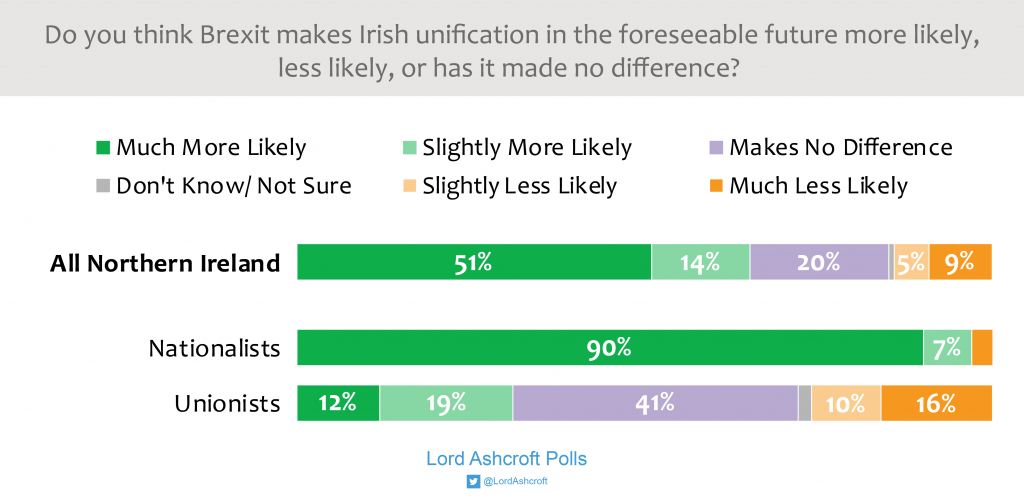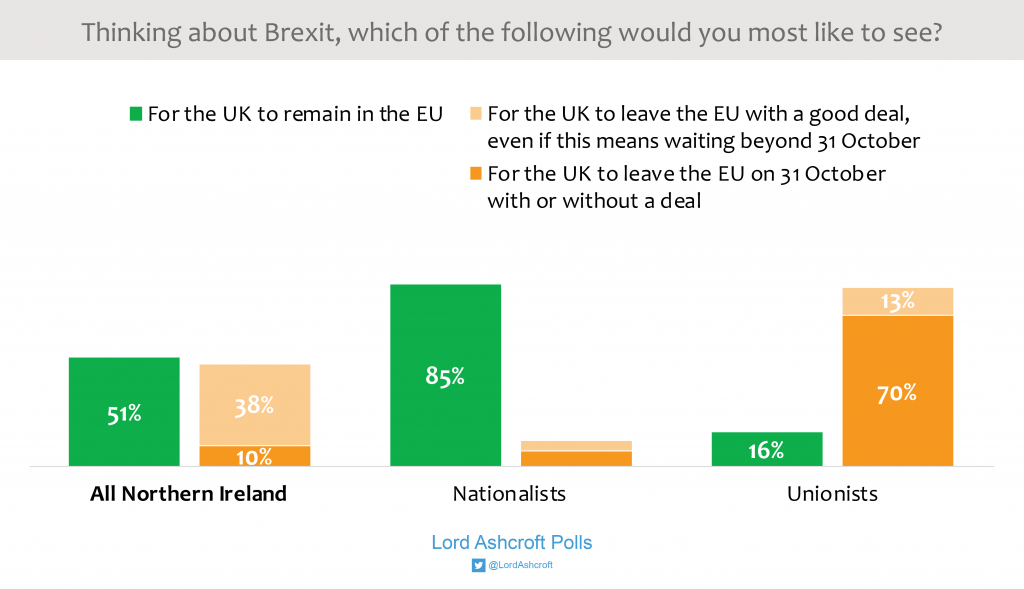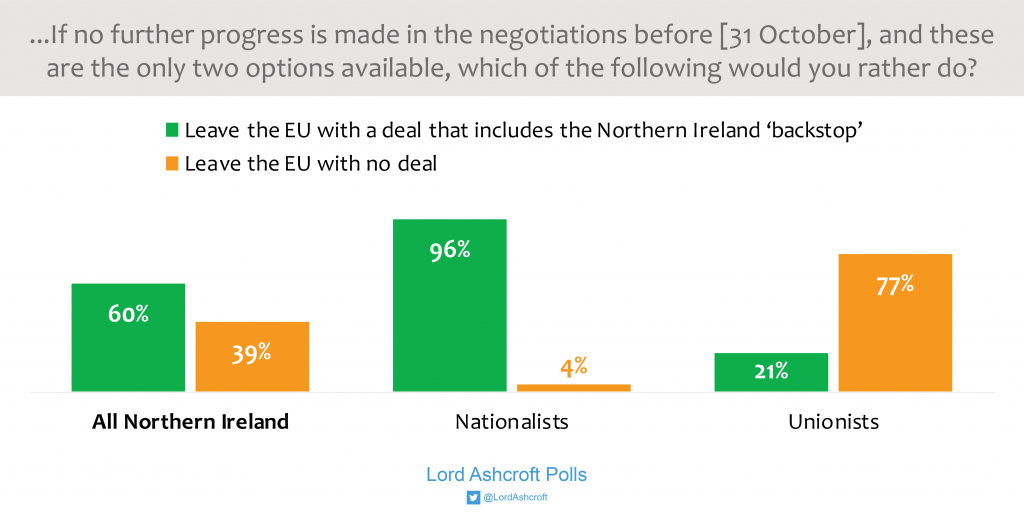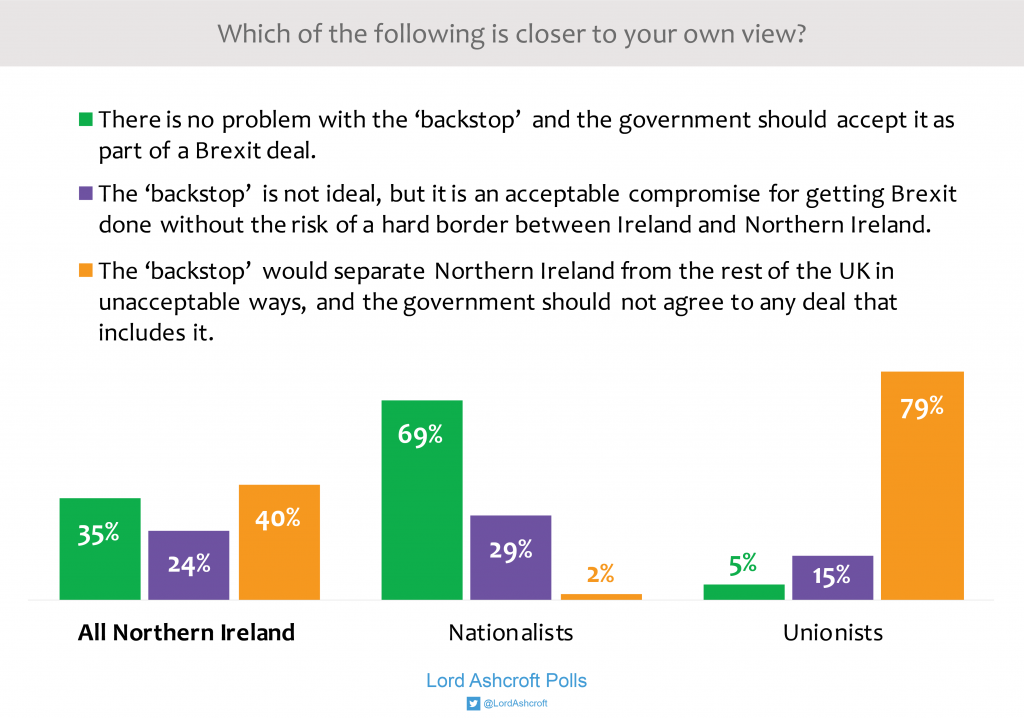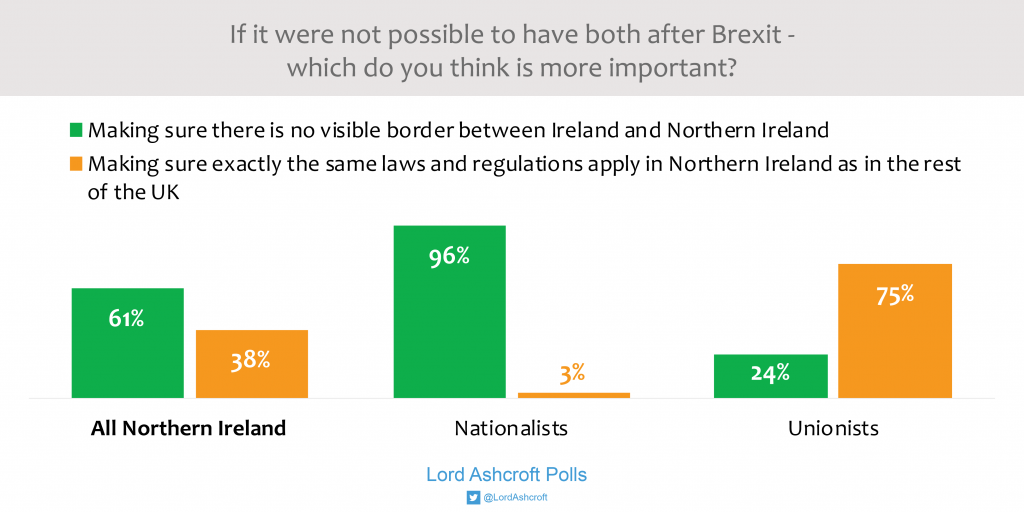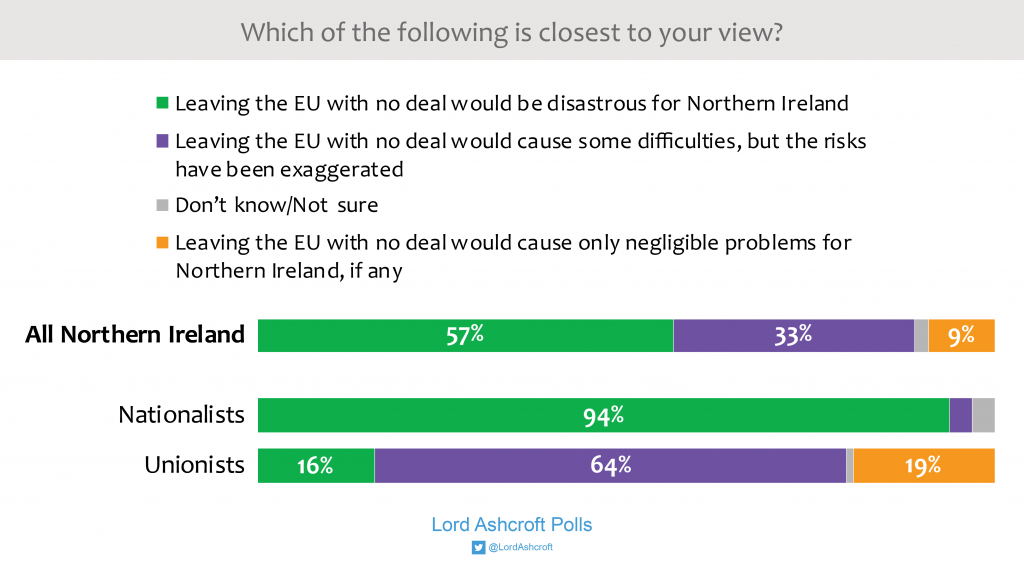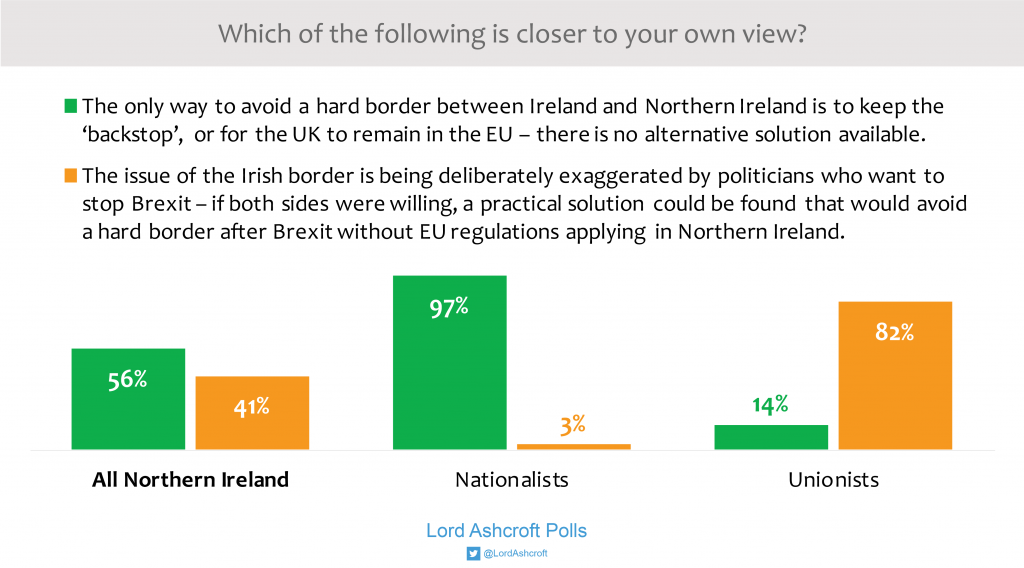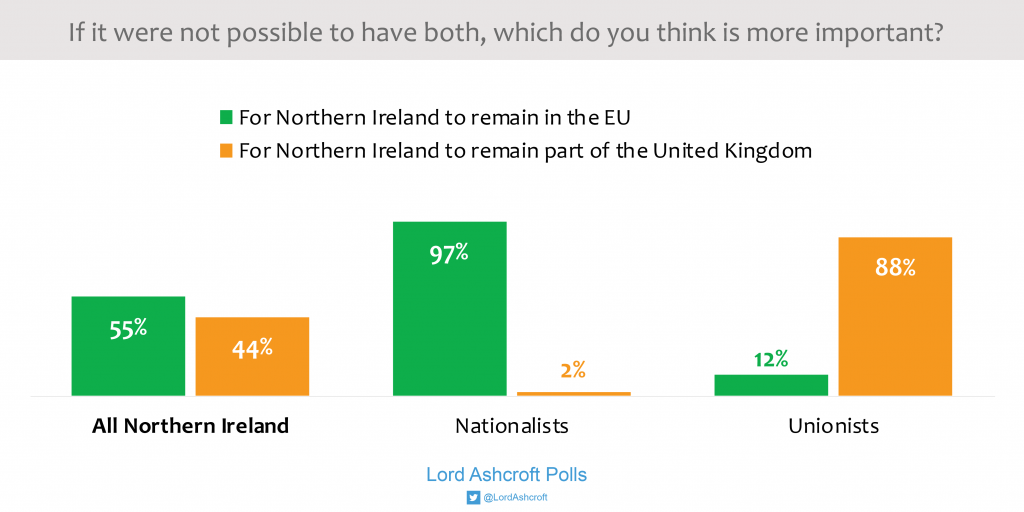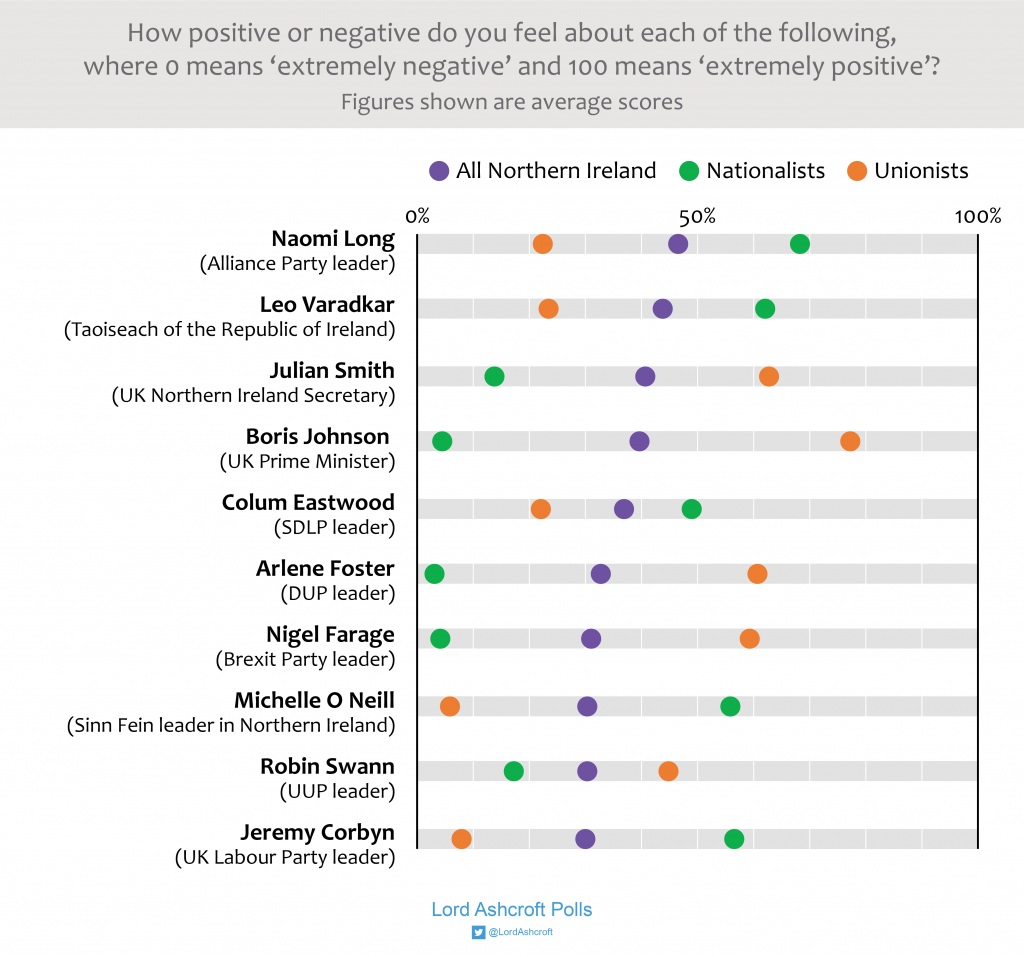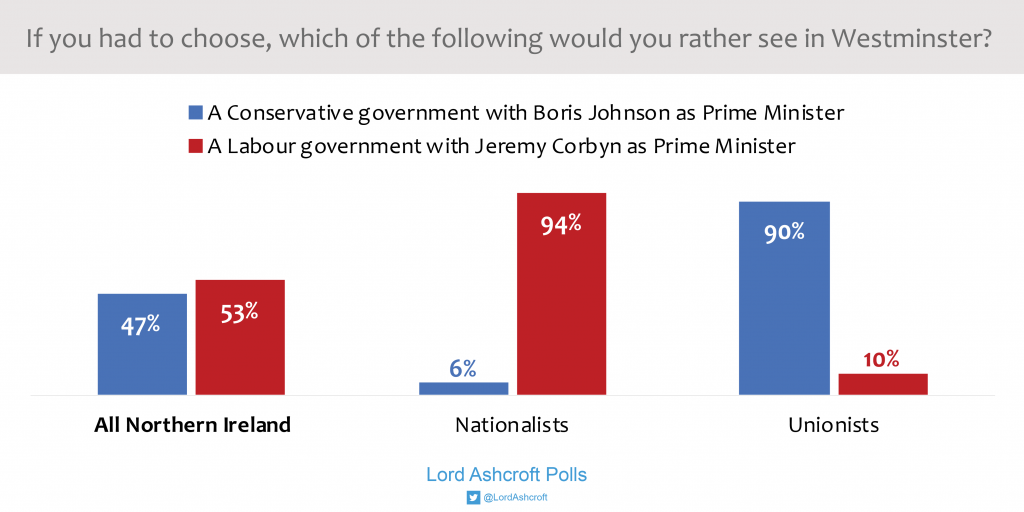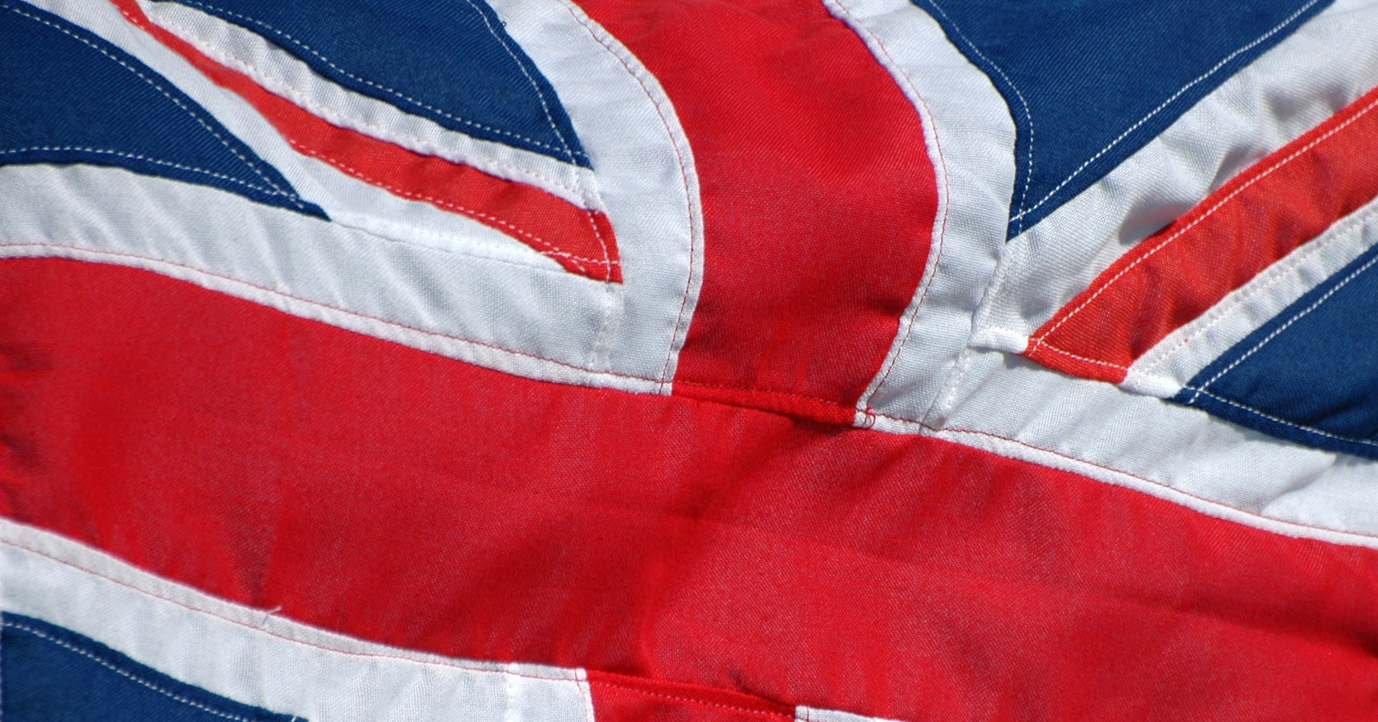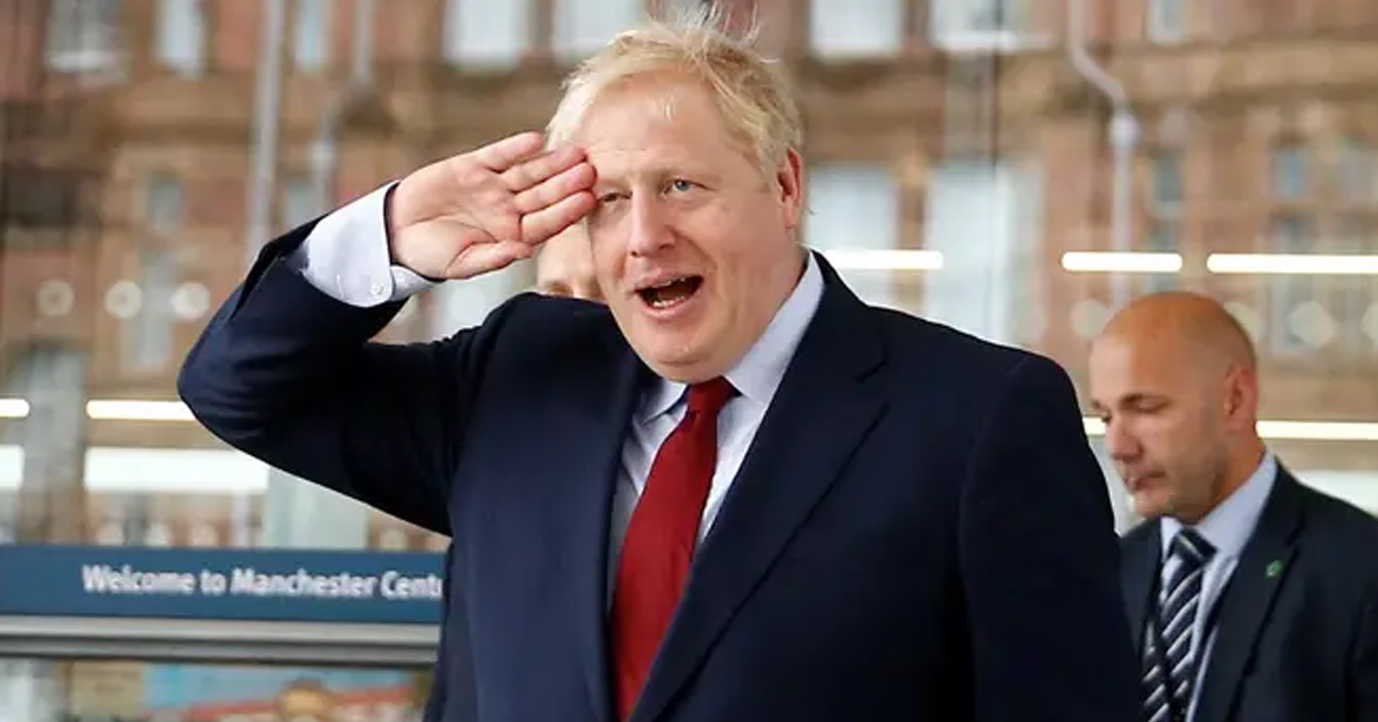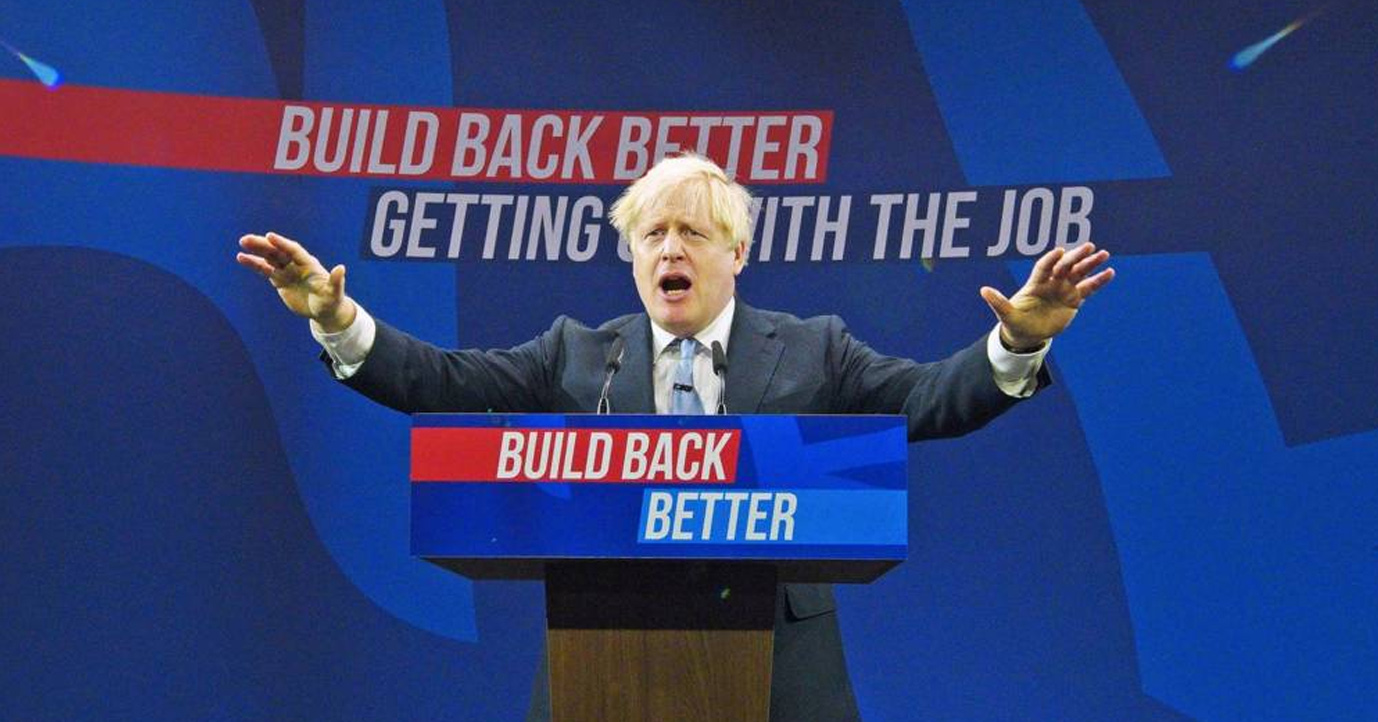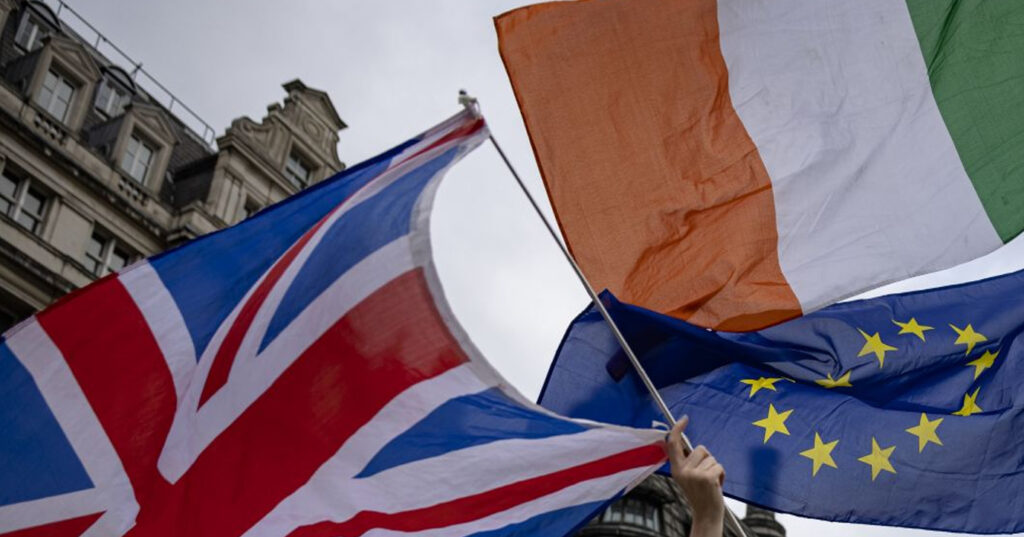
Last month my polling in Scotland found a small lead for independence. My latest research, a survey in Northern Ireland, brings equally gloomy news for unionists: a slender lead for Irish unification in the event of a referendum on whether or not Northern Ireland should remain part of the United Kingdom.
In my poll, 45% said they would vote to stay in the UK, and 46% said they would choose to leave and join the Republic of Ireland – a lead of 51% to 49% for unification when we exclude don’t knows and those who say they would not vote. This is in fact a statistical tie and well within the margin of error. Such a result might also reflect the uncertainty and anxiety surrounding Brexit, the Irish border and its potential effect on life in the province, which could recede when the outcome is settled. Be that as it may, the result underlines what could be at stake in the quest for a workable Brexit solution on the island of Ireland.
People divided predictably enough by tradition, though one in twenty self-declared unionists said they would opt for unification and a further 6% said they didn’t know how they would vote. Women (13%) were much more likely than men (3%) to say they were not sure what they would do. The over-65 age group was the only one with a clear majority for staying in the union (55% to 34%); 45-64s divided evenly, and a majority of those aged up to 44 said they would vote for unification.
While only 8% of unionists said they thought such a “border poll” should take place within the next decade, one in three of them thought it was likely to happen within this timescale – as did nine in ten nationalists.
A majority think that in a referendum tomorrow, Northern Ireland would, in fact, choose to remain part of the UK. But when we asked what the outcome would be in ten years’ time, the result was reversed: most believe the vote would be for unification, with only three in ten believing voters would choose the UK. Unionists are markedly less confident about the chances of winning a more distant referendum: while 87% think Northern Ireland would vote to stay in the UK if a border poll were held tomorrow, this falls to just 59% if a ballot were held a decade from now. Nationalists are correspondingly more confident: while only just over half think the province would vote for unification tomorrow, 93% think this would be the case in ten years’ time.
Nearly half of Northern Ireland voters say they feel less close to the rest of the UK than they did five years ago. This includes the great majority of nationalists, as well as 70% of those who voted to remain in the EU. Around one in six unionists overall say they feel less close to the UK now.
More than half of voters in Northern Ireland, including nearly one in five unionists, think Brexit strengthens the case for unification. And whatever the merits of the argument, nearly two thirds think Brexit makes unification in the foreseeable future more likely. This includes more than three in ten unionists, nearly one in eight of whom think it makes the eventuality much more likely.
For half of Northern Ireland voters, including 85% of nationalists and remain voters – the preferred outcome of the Brexit standoff would be for the UK to remain in the EU. Nearly four in ten back Boris Johnson’s position of leaving on October 31 with or without a deal – the most popular choice for 70% of unionists, and 82% of leave voters. Only one in ten say they would most like to leave the EU with a good deal even if this means waiting beyond next month’s deadline.
If the choice on Brexit came down to leaving with a deal that includes the backstop or leaving with no deal, six in ten Northern Ireland voters (including 96% of nationalists) said they would choose the backstop. However, only one in five unionists say they are prepared to accept it: 77% of them said they would rather leave with no deal.
Overall, a quarter of Northern Ireland voters agree that the backstop “is not ideal, but it is an acceptable compromise for getting Brexit done without the risk of a hard border”. Only 15% of unionists take this view. Nearly eight in ten unionists believe the backstop “separates Northern Ireland from the rest of the UK in unacceptable ways, and the government should not agree to any deal that includes it.” Meanwhile, for a clear majority of nationalists, “there is no problem with the backstop and the government should accept it as part of a Brexit deal.”
By the same token, three quarters of unionists believe that if it comes to a choice between the two, “making sure exactly the same laws and regulations apply in Northern Ireland as in the rest of the UK” is more important than “making sure there is no visible border between Ireland and Northern Ireland.” Nearly nine in ten remain voters, and 96% of nationalists, take the opposite view.
A majority believe a no-deal Brexit would be “disastrous” for Northern Ireland. Nationalist voters are nearly unanimous in this view. Among unionists, the majority opinion, held by around two thirds, is that no deal “would cause some difficulties, but the risks have been exaggerated.” Fewer than one in ten voters overall believe a no-deal Brexit would cause “only negligible problems for Northern Ireland, if any.”
Despite this, four in ten voters, including more than eight in ten unionists, agreed with the statement that the border issue “is being deliberately exaggerated by politicians who want to stop Brexit – if both sides were willing, a practical solution could be found that would avoid a hard border after Brexit without EU regulations applying in Northern Ireland.” However, a majority overall, including nearly all nationalists, agree that the only way to avoid a hard border “is to keep the backstop, or for the UK to remain in the EU – there is no alternative solution available.”
When it came to the bigger choice, Northern Ireland voters as a whole said it was more important for them to remain in the EU than in the UK, by 55% to 44%. While nationalists were unsurprisingly all but unanimous in choosing the EU, 12% of self-declared unionists said that if it were not possible to have both, they thought it was more important to remain in the EU than to stay part of the UK.
Asked how they felt about various political leaders, voters as a whole put the Alliance Party’s Naomi Long at the top of the list, with Ireland’s Taoiseach Leo Varadkar second and Boris Johnson – who scores higher marks among unionists than Arlene Foster – in third place overall. Jeremy Corbyn scores highest among nationalists, who give him the third highest marks behind Long and Varadkar.
Boris Johnson pips Jeremy Corbyn to the title of best Prime Minister among Northern Ireland voters by 45% to 41%. This may be because while nearly nine in ten unionists and leave voters name Johnson, nationalists – perhaps on principle – are more likely to say they don’t know, though 80% of them say they prefer Corbyn.
However, if they had to choose between a Labour government with Jeremy Corbyn as PM or a Conservative government led by Boris Johnson, Northern Ireland voters as a whole plump for the former by 53% to 47% – though nine in ten unionists prefer Johnson and the Tories.
